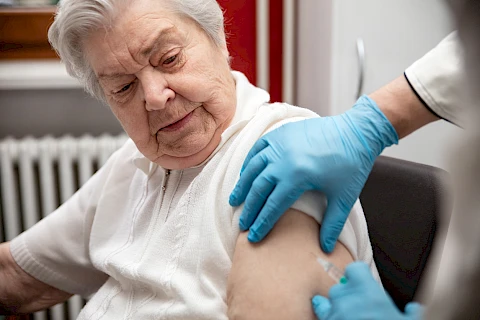
Flu season can pose serious risks to older adults due to their weakened immune systems, making it harder to fight off infections. This vulnerability can lead to complications such as pneumonia, dehydration, and worsening of pre-existing health conditions. Protecting seniors during flu season can make a significant difference in reducing their risk.
The Importance of Flu Shots
Flu vaccines target the most common strains of the virus each year. These vaccines can reduce the risk of hospitalization and death from the flu in seniors. They are generally safe, with mild side effects like soreness at the injection site or a low fever. Widespread flu vaccination in the senior population also contributes to "herd immunity", safeguarding those who cannot get vaccinated due to medical reasons. Seniors can access flu shots through primary care physicians, local pharmacies, and community health clinics.
Good Hygiene Practices
Keeping hands clean is one of the simplest yet most effective methods to avoid getting sick. Proper handwashing involves scrubbing with soap and water for at least 20 seconds, especially after coughing, sneezing, or touching potentially contaminated surfaces.
Sanitizers and disinfectants are great alternatives when soap and water aren't available. Encourage seniors to use hand sanitizer with at least 60% alcohol to reduce the spread of germs. Remember to disinfect frequently touched objects like doorknobs, remote controls, and phones. Masks and social distancing can add an extra layer of protection. Wear a mask and keep a safe distance from others when in crowded places or during flu outbreaks to minimize the risk of transmission.
Recognizing Early Flu Symptoms
Identifying early flu symptoms can allow for quicker intervention and better outcomes. Common flu symptoms in seniors include:
- Fever or feeling feverish
- Cough
- Sore throat
- Runny or stuffy nose
- Body aches
- Fatigue
Flu symptoms can sometimes be mistaken for other illnesses. Pay attention to any sudden changes in their health and behavior. Seniors with chronic conditions like heart disease or diabetes may experience more severe symptoms, making it even more vital to stay vigilant. When in doubt, seek medical advice.
What to Do if a Senior Shows Flu Signs
If a senior loved one starts showing signs of the flu, take immediate steps to manage their symptoms and prevent complications. Isolate them from others to avoid spreading the virus. Ensure they get plenty of rest and stay hydrated by drinking clear fluids like water, herbal teas, and broth. Over-the-counter medications can alleviate symptoms like fever, cough, and congestion. Always consult with a healthcare provider before giving any new medication.
Keep the environment comfortable. Consider using a humidifier to keep the air moist, which can ease breathing and sore throats. Monitor their condition closely and check for signs that may indicate the need for medical attention, such as difficulty breathing, chest pain, or confusion. Don't hesitate to consult healthcare professionals for further guidance and care.
In-Home Support for Seniors This Flu Season and Beyond With Senior Helpers
Protecting seniors during flu season requires taking necessary precautions, monitoring their health closely, and seeking medical advice at the first signs of flu symptoms. If you’re considering getting in-home care for a senior loved one during flu season and beyond, we can help. Senior Helpers Moanalua-Honolulu offers professional senior care services, including assistance with personal hygiene, meal planning, help with daily activities, and more. Contact us for tailored senior care in Honolulu and Fort Shafter.